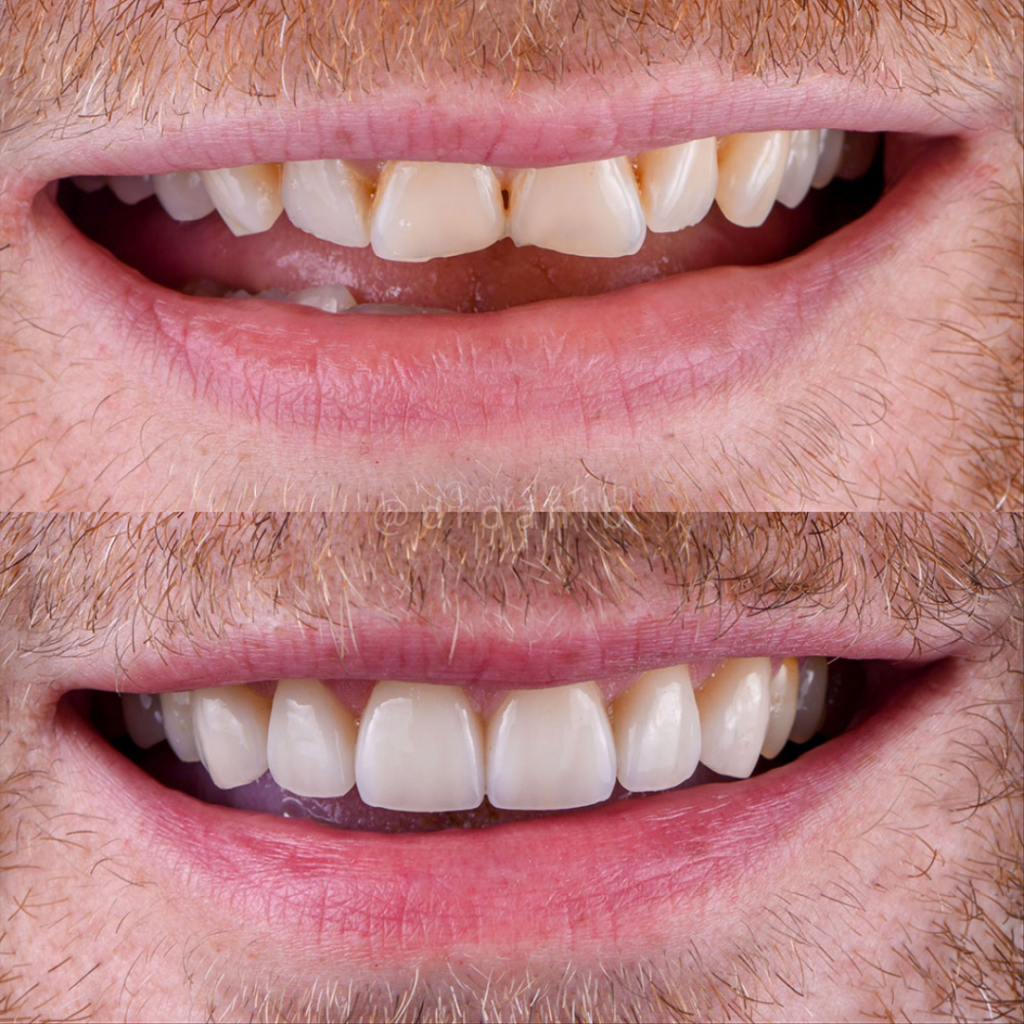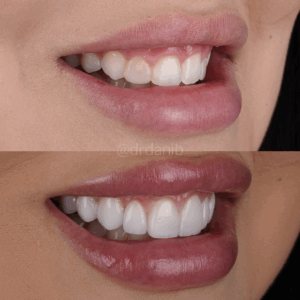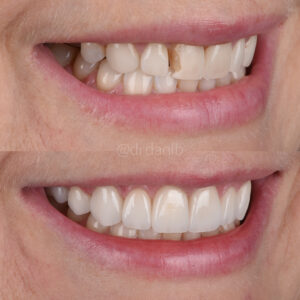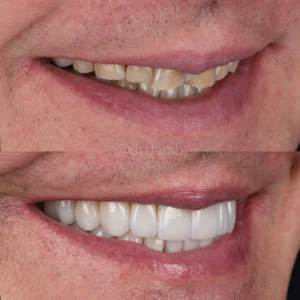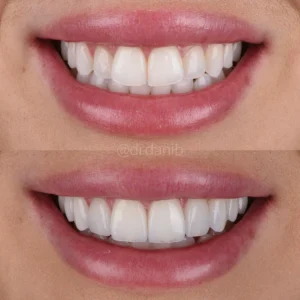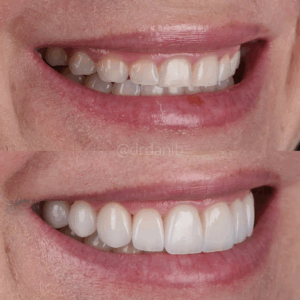Veneers are thin, custom-made shells that are bonded to the front surface of teeth to improve their appearance. While traditional veneers require significant tooth preparation, minimal prep veneers offer a less invasive and more conservative alternative. This article explores the key reasons why minimal prep veneers may be a superior choice for certain patients.
Traditional veneers involve removing a significant amount of enamel from the tooth surface to create space for the veneer. This preparation process can be time-consuming and may lead to increased tooth sensitivity. In contrast, minimal prep veneers require minimal or no tooth preparation, preserving more of the natural tooth structure. This less invasive approach often results in a quicker and more comfortable procedure with reduced risk of sensitivity.
Dr. Dani B. is a renowned veneer expert who creates customized, handcrafted veneers that require minimal tooth alteration, making the procedure comfortable and less invasive. This article aims to shed light on the advantages of minimal prep veneers, particularly for individuals seeking a conservative and minimally invasive approach.
Reason #1: Preservation of Natural Tooth Structure
Minimal prep veneers prioritize the preservation of natural tooth structure by requiring minimal or no enamel removal. This contrasts with traditional veneers, which often necessitate significant enamel reduction. By conserving more of the original tooth, minimal prep veneers help maintain long-term oral health and reduce the risk of tooth sensitivity.
Traditional veneers typically involve removing a significant amount of enamel, often up to 0.5-1.0 millimeters, to create space for the veneer. This preparation process can weaken the tooth structure and increase the risk of sensitivity, particularly in the early stages of healing. Minimal prep veneers, on the other hand, require minimal or no enamel removal, preserving the tooth’s natural strength and reducing the risk of sensitivity.
By preserving more of the natural tooth structure, minimal prep veneers can help maintain the long-term health of the teeth. This can lead to reduced risk of sensitivity, improved bite function, and enhanced overall oral health. Additionally, the less invasive nature of minimal prep veneers often results in a quicker and more comfortable healing process.
Reason #2: Reduced Tooth Sensitivity
The less invasive nature of minimal prep veneers contributes to a lower risk of post-treatment sensitivity. Traditional veneer procedures, which may involve removing substantial amounts of enamel, can increase the likelihood of sensitivity due to the exposure of the underlying dentin.
The enamel is the hard outer layer of the tooth that protects the sensitive dentin layer beneath. When enamel is removed during traditional veneer preparation, the dentin is exposed, making the tooth more susceptible to temperature changes and other stimuli. This can increase sensitivity to hot, cold, sweet, or acidic foods and drinks.
Reason #3: Minimally Invasive Procedure
Minimal prep veneers are a conservative cosmetic treatment that minimizes the need for drilling and reshaping teeth. This less invasive approach often translates to a quicker and more comfortable patient experience.
The minimally invasive nature of minimal prep veneers allows for a faster and more comfortable procedure. With less tooth preparation required, the procedure time is often shorter, and there is less risk of discomfort or pain during and after the procedure.
Reason #4: Faster Treatment Time
The streamlined preparation process of minimal prep veneers allows for faster treatment times than traditional veneers. Fewer dental visits are typically required, making it an ideal option for patients seeking rapid cosmetic results.
The reduced need for tooth preparation in minimal prep veneers significantly shortens the treatment time. This means patients can achieve their desired smile transformation in fewer dental visits, making it a convenient option for busy individuals.
Reason #5: Reversible or More Easily Adjusted
While not fully reversible, minimal prep veneers have a less permanent impact on the natural tooth structure. This makes them easier to modify or replace if future adjustments are desired.
While not fully reversible, minimal prep veneers have a less permanent impact on the natural tooth structure. Unlike traditional veneers, which require significant tooth reduction, minimal prep veneers preserve more of the natural tooth structure. If future adjustments or replacements are needed, the procedure can be less invasive, and the impact on the underlying tooth is minimized.
If a patient’s needs or preferences change, minimal prep veneers can be more easily modified or replaced. This flexibility allows for greater customization and adaptability in achieving long-term smile satisfaction.
Also, Check Our Before and After Gallery!
Reason #6: Strong, Thin Material for a Natural Appearance
Advances in veneer materials have enabled minimal prep veneers to be thin yet durable and natural-looking. These veneers can offer a translucent, lifelike appearance that mimics natural teeth.
Modern veneer materials are designed to be thin and translucent, allowing the natural tooth color to show through. This creates a more natural and aesthetically pleasing result compared to thicker, more opaque traditional veneers.
Reason #7: Suitable for Minor Cosmetic Adjustments
Minimal prep veneers are well-suited for addressing minor cosmetic imperfections, such as slight discoloration, small gaps, or minor misalignments. While they may not be the best option for extensive cosmetic changes, they are ideal for patients with more subtle concerns.
Minimal prep veneers are a great option for patients who want to make subtle improvements to their smile. They can help to correct minor imperfections without requiring significant tooth preparation or altering the overall shape of the teeth.
While minimal prep veneers are excellent for addressing minor cosmetic issues, they may not be suitable for significant changes, such as closing large gaps or completely reshaping the teeth. In these cases, traditional veneers or other restorative treatments may be more appropriate.
Reason #8: Less Impact on Gum Health
The minimal preparation required for minimal prep veneers has a reduced impact on gum tissue, minimizing the risk of irritation. Preserving more of the natural tooth shape can lead to better gum adaptation around the veneers.
By minimizing the amount of tooth structure removed, minimal prep veneers help preserve the natural contours of the teeth. This can lead to better gum health and reduce the risk of gum irritation or recession, which can occur with more aggressive preparation techniques.
Preserving the natural tooth shape allows the gums to adapt more easily to the veneers. This can help to maintain gum health and prevent issues such as gum recession or inflammation.
Reason #9: Customizable to Match Individual Preferences
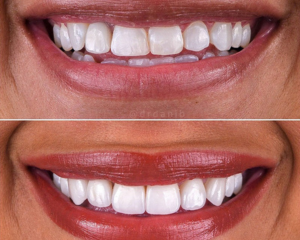 Minimal prep veneers offer a high degree of customization, allowing Dr. Dani B. to work with your natural tooth structure to achieve their desired aesthetic goals. These veneers can be designed to match tooth color, size, and shape preferences.
Minimal prep veneers offer a high degree of customization, allowing Dr. Dani B. to work with your natural tooth structure to achieve their desired aesthetic goals. These veneers can be designed to match tooth color, size, and shape preferences.
Dr. Dani B. can customize minimal prep veneers to match your unique smile goals. This includes matching the color, shape, and size of the veneers to complement your natural teeth and facial features.
He can use a variety of techniques to customize minimal prep veneers, such as shade matching, contouring, and layering. This allows for a highly personalized and aesthetically pleasing result.
FAQs Section
Q: Are minimal prep veneers as durable as traditional veneers?
A: While both types of veneers can be durable, the longevity of minimal prep veneers may depend on factors such as oral hygiene practices, bite forces, and the specific materials used. However, with proper care, minimal prep veneers can last for many years, often 10-15 years or more.
Q: Are minimal prep veneers as durable as traditional veneers?
A: While both types of veneers can be durable, the longevity of minimal prep veneers may depend on factors such as oral hygiene practices, bite forces, and the specific materials used.
Q: How long do minimal prep veneers last?
A: As mentioned above, with proper care, minimal prep veneers can last for 10-15 years or more. However, oral hygiene, diet, lifestyle habits, and other factors can influence their longevity. Regular dental check-ups and professional cleanings can help extend the life of your veneers.
Q: Can minimal prep veneers fix major tooth misalignment?
A: Minimal prep veneers are best suited for addressing minor cosmetic issues, such as slight discoloration, small chips, or minor gaps. For significant tooth misalignment, orthodontic treatment or other restorative procedures may be more appropriate.
Q: Do minimal prep veneers stain over time?
A: While minimal prep veneers are less prone to staining than natural teeth, good oral hygiene practices, including regular brushing, flossing, and professional cleanings, can help maintain their appearance. It’s also advisable to avoid consuming excessive amounts of staining substances like coffee, tea, and red wine.
Q: What’s the recovery time after getting minimal prep veneers?
A: Minimal prep veneers typically have a shorter recovery time compared to traditional veneers. Most patients can return to their normal routine shortly after the procedure. However, it’s important to follow Dr. Dani B.’s post-procedure care instructions to ensure optimal healing.
Conclusion
Minimal prep veneers provide a conservative and minimally invasive approach to enhancing smiles. By preserving natural tooth structure, reducing sensitivity, and offering faster treatment times, they can be a compelling option for many patients.
Minimal prep veneers offer several advantages, including:
- Preservation of natural tooth structure
- Reduced tooth sensitivity
- Minimally invasive procedure
- Faster treatment time
- Reversible or more easily adjusted
- Strong, thin material for a natural appearance
- Suitable for minor cosmetic adjustments
- Less impact on gum health
- Customizable to match individual preferences
Dr. Dani B. can evaluate your oral health, assess the extent of the desired cosmetic changes, and recommend the most suitable type of veneer for your individual case. Contact us today!


